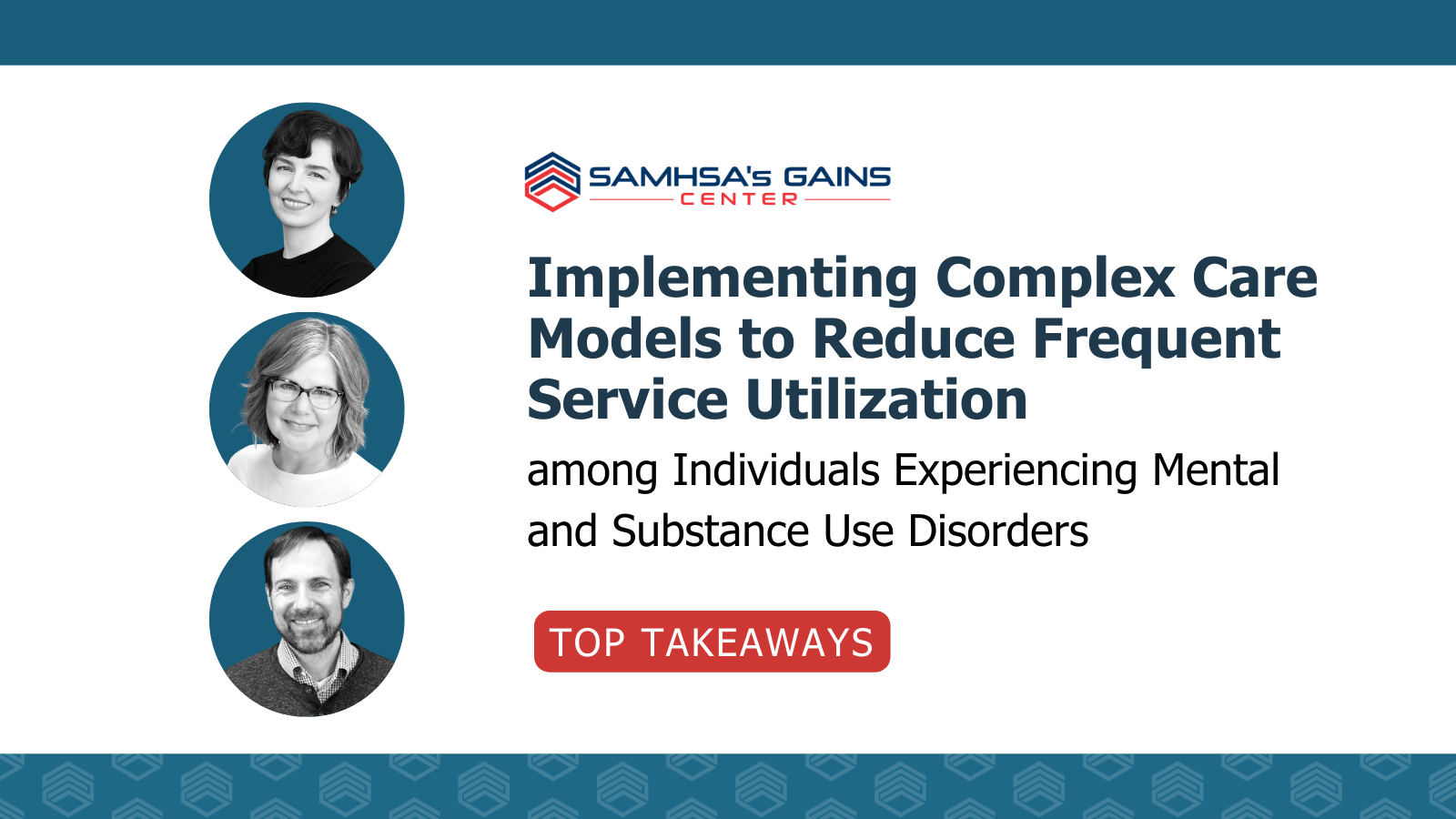Healthcare systems are grappling with the challenge of improving outcomes for people with complex physical and behavioral health needs that result in frequent service utilization. These individuals often require intensive, coordinated care to manage their conditions effectively. Addressing this issue is crucial for supporting these individuals’ recovery and alleviating the demands that frequent utilization places on healthcare systems.
SAMHSA’s GAINS Center hosted a webinar titled “Implementing Complex Care Models to Reduce Frequent Service Utilization Among Individuals Experiencing Mental and Substance Use Disorders.” This event highlighted innovative care models designed to improve service delivery for this population. Below are actionable insights for behavioral health professionals.
What are the primary goals of complex care models in addressing mental health conditions and substance use disorders?
Complex care models aim to provide highly coordinated, person-centered care to individuals with significant physical, behavioral health, and social challenges. The primary goals include improving health outcomes, reducing preventable utilization, and achieving better well-being by integrating health-related social needs and employing interdisciplinary care teams.
Who benefits the most from complex care models?
Complex care models are designed for individuals with an array of comorbid physical and behavioral health conditions and health-related social needs. This group includes people with serious behavioral health needs, multiple chronic conditions, nursing home eligibility, serious illness, high preventable utilization, and housing and financial insecurity.
What is the Ecosystems of Care model?
The Ecosystems of Care model focuses on creating a coordinated network of community-based services that work collectively to address the root causes of poor health and well-being. This model emphasizes system-improvement activities and meaningful consumer participation.
How does the Recovery-Oriented Systems of Care (ROSC) model support individuals with substance use disorders?
The ROSC model is person-centered and builds on the strengths and resiliencies of individuals, families, and communities. It integrates trauma-informed care principles, promotes early intervention and recovery support, and involves a decision-making process with multiple interested parties to improve access, quality, and effectiveness of care.
What are the key principles of trauma-informed care in the ROSC model?
Trauma-informed care principles in the ROSC model include safety, trust and transparency, peer support, collaboration, and empowerment. These principles are integrated into policies, procedures, and practices to prevent re-traumatization and support recovery for individuals with substance use disorders.
What are some examples of integrated care approaches?
Integrated care approaches include embedding peer recovery coaches and physicians trained in medications for addiction treatment into emergency departments (e.g., CA Bridge Program), and enhanced primary care models like the Transitions Clinic Network, which employs interdisciplinary care teams to improve quality care for chronic conditions.
How does the Better Care Playbook support the implementation of complex care models?
The Better Care Playbook is an online resource center offering evidence-based and promising practices for improving care for people with complex health and social needs. This resource includes practical tools, case studies, webinars, and blog posts designed to help healthcare practitioners and leaders translate evidence into practice.
What role do community health workers (CHWs) play in complex care models?
CHWs are increasingly integrated into complex care programs to address health-related social needs. They improve chronic disease management, population health, and patient experience, and reduce acute care utilization.
How can behavioral health professionals strengthen their practices?
Behavioral health professionals can adopt integrated care approaches, utilizing resources from the Better Care Playbook, incorporating CHWs into care teams, and using tools like the Ecosystem Assessment Tool to evaluate and strengthen their care models. By focusing on person-centered, trauma-informed care, professionals can improve outcomes for individuals with complex needs.
For more in-depth information and practical insights, we encourage you to watch the full webinar and explore the resources provided by the GAINS Center.
Resources
- Better Care Playbook
- Koppel, R. (2023). Ecosystems of care 101. Camden Health.
- National Council for Mental Wellbeing. (2022). Trauma-informed, recovery-oriented systems of care toolkit. Indiana Family and Social Service Administration.
This blog post was developed with the assistance of generative artificial intelligence.


